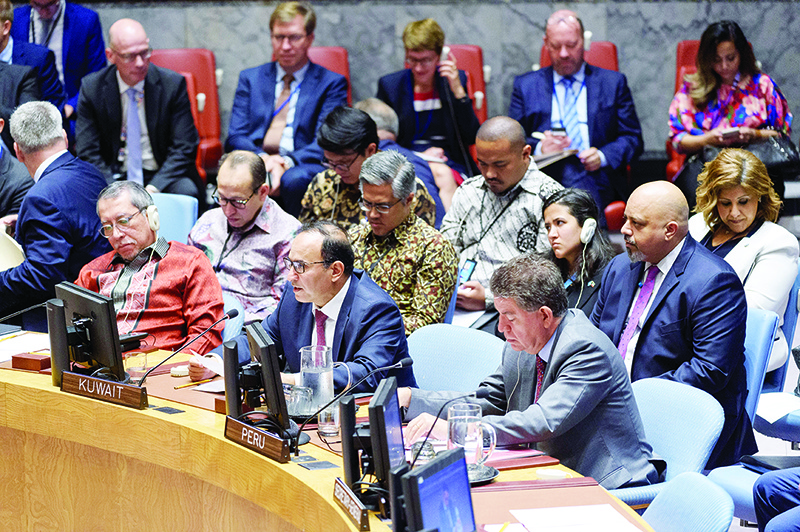

NEW YORK: Kuwaithas urged all parties to abide by and respect their obligations underinternational humanitarian law (IHL). This came in a speech by Kuwait'sPermanent Representative to the United Nations Ambassador Mansour Al-Otaibi ata UN Security Council (UNSC) meeting held on Tuesday evening about encouragingand strengthening IHL. This year marks the 70th anniversary of the 1949 GenevaConventions, which resulted in the aftermath of the most devastating war inhumanity, the Second World War (WW2), when the UN was founded as a result ofits effects and losses and to prevent another devastating war, he said. Thescale of violence and suffering witnessed in different conflict zones around the worldover the past decades is no less than the amount ofviolence and suffering that the world witnessed in WW2 74 years ago, he added.
Strengthening therule of law, especially IHL, is highly vital, Otaibi pointed out, noting thatthe four Geneva Conventions and their Additional Protocols provide the legalframework for the protection of human beings during wars and armed conflicts.The world is still witnessing neglect and flagrant disregard for theimplementation of the provisions of these agreements in recent times, hewarned.
Otaibi reviewedexamples of disregard, such as what is happening in the occupied Palestinianterritories, Syria and the Rohingya minority in Myanmar. The fundamental answeris by strengthening the rule of law and respecting humanitarian principlesduring armed conflict, but the question is how can it be achieved. UNSC has avital and pivotal role in ensuring compliance with IHL and strengthening therule of law by ensuring the full implementation of relevant Security Councilresolutions, particularly in the context of the protection of civilians andcompliance by parties to the conflict and international organizations operatingin the field, he noted.
Otaibi underlinedthe responsibility of the UN Peacekeeping forces to protect civilians withintheir mandate, providing security for the camps of the displaced, medicalevacuation of the wounded and strengthening the capabilities of the nationalpolice to carry out responsibilities. He also stressed ensuring accountabilityfor war crimes, genocide and crimes against humanity, guaranteeing that thoseresponsible for targeting civilians will be held accountable.
Otaibi saidsanctions could play an important role in ensuring that those responsible forviolations of IHL and international human rights law are held accountable ifused in an effective manner. He said member states should apply the existinginternational laws more fully through specific practical and operationalmeasures, while no one can deny different national priorities and policies.
It is oftendifficult to coordinate all positions uniformly but this should not in any wayaffect obligations and responsibilities under international law, especially inthe humanitarian field, the provision of humanitarian assistance and allowingunhindered access to the needy, he said. He renewed the call not to use theveto to block international humanitarian convoys from reaching the needy,pointing out the possibility of redoubling efforts at the bilateral level,especially through the exchange of experiences and best practices betweencountries. - KUNA


